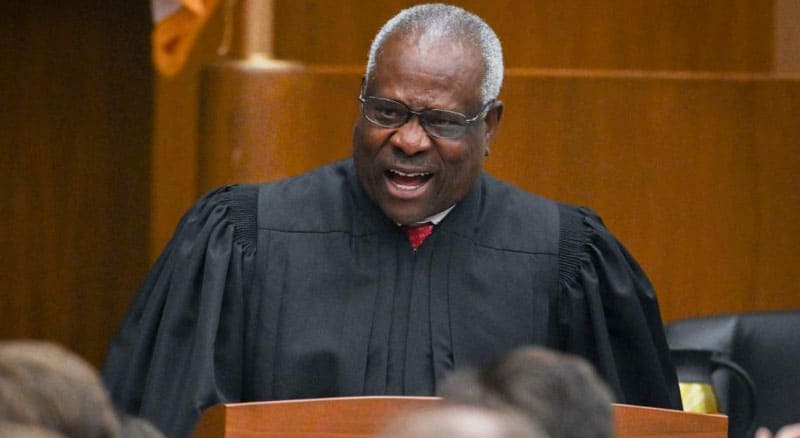Supreme Court Justice Clarence Thomas has warned that misguided liberal policies “destroy people” and will ultimately end up destroying “liberty” and “free society” altogether.
Justice Thomas spoke out against the Left in his new book, “Created Equal: Clarence Thomas in His Own Words.”
The book, written by Michael Pack and Mark Paoletta, is based on over 30 hours of interviews conducted with Thomas and his wife, Ginni.
The interviews were done for the film of the same name but 95% of the book’s material is new.
Thomas discusses his views on the radical Left and violent leftist movements such as Black Lives Matter and “Defund the Police.”
Below is an excerpt from the book.
Michael Pack: You have talked a little today about how life in the black community has not been improved by many well-intentioned social programs. Do you think, in some sense, it is worse than when you grew up?
Clarence Thomas: It’s a disaster. When I grew up, you had family, you didn’t have drugs, you didn’t have gang-banging. You could walk down the street. There was a change in our society. I think that these programs certainly had an impact.
Just go back to Savannah and take a look around you. Our worst fears were realized. We didn’t want to be right; we wanted to be wrong. It wasn’t about winning an argument.
No, we wanted to lose the argument. We did not want the damage to occur; that’s why we were involved. I don’t particularly like public life; I never wanted to be in public life.
I’d like to go to football games. I’d like not to make decisions about other people’s lives, but what drags you into it is when you see these principles being undermined, which leads to such destruction.
The policies destroy people, and, ultimately, I think, we’re going to destroy the very thing that allows us to have liberty and to have a free society.
MP: So the heirs to those movements, like Black Lives Matter, focus on other things: mass incarceration, police brutality. What do you think of the current movements for racial justice?
CT: I don’t really follow the movements du jour. I don’t quite understand them. It’s fascinating to me that the radical groups in the ’60s, that we all were aware of and fond of back then, like the Black Panthers — that’s kind of mainstream now. But we knew they were more marginal back then.
I don’t know what to say about this. But if you look at some of the things that still are problematic, like bad education, unsafe neighborhoods, drugs, alcohol, breakdown in families, it seems like these are things that we warned about back then. We were told, basically, take a long walk on the short pier.
And I understand that. I understand people not wanting to hear an opposing view.
But at the same time, we’re not taking ownership of these policies’ having a significant role in the damage that’s been done.
MP: You’ve made many trips back to both Pin Point and Savannah. When you return, do you reflect on your life? Do you reflect on how it is now?
CT: I don’t reflect a lot about these sorts of things. A lot of this is depressing, and it didn’t have to happen. The Savannah that I return to is not the Savannah I grew up in.
There are good parts, you’re free to move about. You don’t have the segregation, but you’ve got pathologies that we didn’t have before.
You’ve got the crime we didn’t have before. You’ve got the disintegration of families that you didn’t have before, disorder you didn’t have before.
And they were things that were avoidable. You didn’t have to do that to poor people, and it’s just heartbreaking. Something has changed, so it’s kind of hard to go back.
MP: Why do you think these activists promote these policies? Don’t they have good intentions?
CT: We were talking before about people will push a policy that makes them feel good. “Oh, I feel good about myself because I put you all in public housing.”
When my grandfather saw all these high-rises for public housing, he thought it was awful.
I remember when we visited a relative in New York who lived in one, and he said, “Boy, this don’t make no damn sense: pilin’ po’ people on top of po’ people.”
And it turned out he was right. They tore down Cabrini Green [a Chicago housing project] and many of these notorious high-rise public-housing projects.
They made a prophet out of him because he thought it would just create more problems. And yet the people who pushed it never say, “Oh, we made a mistake.”
And they never take account of the fact the damage they did to the people with their grand experiment, the gangs they created, the drug dealing they accommodated, the destruction of the family that was exacerbated.
All this was not necessarily caused but at least influenced in the wrong direction by the artificiality of the neighborhoods they created.

Our comment section is restricted to members of the Slay News community only.
To join, create a free account HERE.
If you are already a member, log in HERE.
Recommended